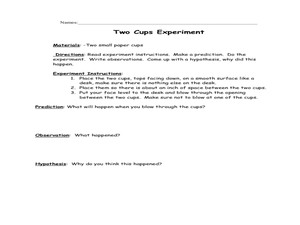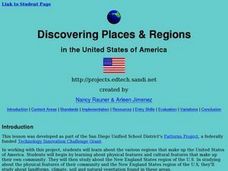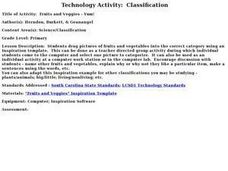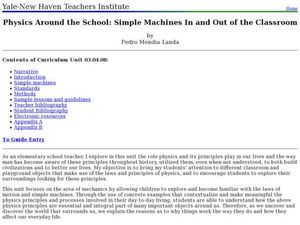Curated OER
What Color is It?
Learners indentify whether an objects reflects or absorbs red, green, and/or blue light. They create a simple spectral signature.
Curated OER
Albert Einstein: How I See the World
Students examine why Einstein rescinded his German citizenship when he was a teenager. They examine what aspects of German life did Einstein disagree with in his early years.
Curated OER
And the Survey Says...
Eighth graders evaluate whether a certain argument is valid or invalid. In this science lesson plan, 8th graders discuss the importance of using unbiased evidence. They design an experiment that they can test in school.
Curated OER
Ecoregions of Texas
Seventh graders discuss why hunter-gatherers might have favored certain areas in which to live. In pairs, they research specific regions to examine in depth. Students present their eco-region vegetation findings (in this case Central...
Curated OER
Understanding Bernoulli's Principle
Fifth graders explain why we fly. For this space science lesson, 5th graders discuss Bernoulli's prinicple and its relation to flight.
Curated OER
"Write" Answers
Students examine the Q.& A. articles found each week in Science Times, focusing on how the answers are presented in a clear and logical way, as well as the relevance of understanding science's roles in our daily lives.
Curated OER
Discovering Places & Regions
Fifth graders research physical and cultural features of a place. They practice skills in gathering information from various sources, using tools such as graphic organizers, word processing, multimedia, and use of the Internet.
Curated OER
LLoyd's Corner
Students write a description of how a local environment has changed over time and why these changes have occurred accordingly. They describe and record changes in Lloyd's corner over time as depicted in pictures taken at four different...
Curated OER
Buoyant Force
Students investigate the scientific concept of why some objects float when put in a liquid solution. They apply the laws of motion and force while conducting classroom activities. Students also take notes and answer target questions to...
Curated OER
Classified Information - Part 1: Shapes
Third graders investigate how and why scientists use classification. They discuss classification strategies using animals, and as a class fill in a flowchart with their responses. Next, in small groups they cut out a variety of shapes...
Curated OER
Antarctica
Students explore why Antarctica is so important to the planet. They investigate the physical characteristics. Students create their own unique treaty of governance for Antarctica and discuss how laws are enforced in Antarctica.
Curated OER
Water and Ice
Young scholars explore the states of matter. In this physical science lesson, students observe what happens to water when it freezes and record observations. Young scholars then observe ice when it melts and record observations.
Curated OER
The Musical Mind
Students go on a tour of how and why music styles have changed over the years, and discover where they can gather some insight about their favorite musical styles and artists. There are excellent websites imbedded in this lesson.
Curated OER
Exploring Indiana's Natural Resources
Fourth graders complete a variety of activities as they study the European exploration of the Midwest, focusing on Indiana. They map the path explorers took, comparing the British with the French. They research why the explorers stopped...
Curated OER
Investigation 6 - Dinosaur Extinction
Fourth graders research and analyze theories on why dinosaurs became extinct. They need to find clues as to what the cause may have been. They record the evidence that they find to support their theory on the Dinosaur Extinction Theory...
Curated OER
Solid Waste and Our Natural Resources: Utilizing the Story THE LORAX
Students gain an introduction to our planet's solid waste problem and our personal responsibility in curbing and solving said problem through the use of Dr. Seuss' book, The Lorax. After hearing the book, class discussion follows.
Curated OER
Making Objects Move
Students will make many discoveries about how and why objects move. They will explore and manipulate the motion of objects and the forces required to control that motion (pushing, pulling, throwing, dropping, rolling, and so on). This...
Curated OER
Fruits and Veggies - Yum!
Students use Inspiration to drag pictures of fruits and vegetables into the correct category. They discuss the name of other fruits and vegetables. They explain why or why not they like that particular fruit or vegetable. Students...
Curated OER
Exploring The Neighborhood of the Solar System
Pupils explain why exploring the universe for life on other planets is an important field of study. They use mathematical formulas to calculate the temperatures of planets as it relates to their distance from the sun. Students use this...
Curated OER
What’s That, I Can’t Hear You?
Young scholars investigate forms of energy as well as light and sound. For this science lesson, students participate in hands-on activities that require them to evaluate how sound affects astronauts in flight. A video of this lesson...
Curated OER
Physics Around the School: Simple Machines In and Out of the Classroom
Students explore different machines and the components that encompass the science of physics. In this physics instructional activity students explore how things move.
Curated OER
Coqui Culture
Students investigate natural and manmade features that are specific to the island of Puerto Rico. They make lists of features after research is conducted using a variety of resources that includes the Internet. They follow-up with class...
Curated OER
Bhutan, the Last Shangri-La: Sandwich Squash: How the Himalayas Were Formed
Young scholars create and record a model of mountain formation. They identify major mountain building formations. Students understand how the Himalaya Mountains were formed, why they are located near Bhutan, and why they are becoming...
Curated OER
Evolution
Students research the theory of evolution and the controversy. In this evolution lesson students view a film on Charles Darwin then they write an essay about whether or not intelligent design should be taught in science class.























